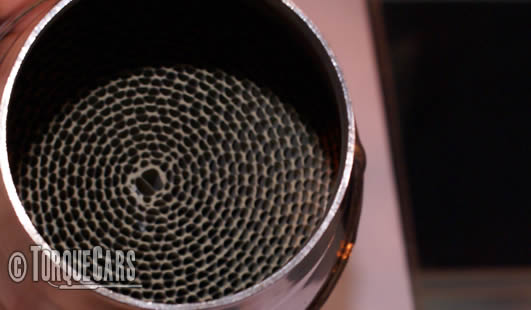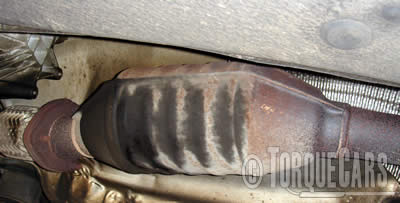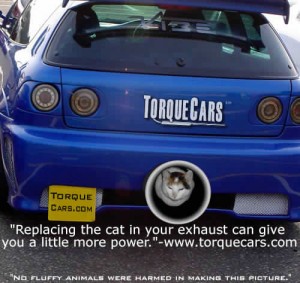Decat pipe or a Sport catalysts?
"A CATastrophy?"
Catalysts are a vital component in our modern tree hugging environmentally conscious society. First TorqueCars will look at what a catalyst does and how it works.
A catalyst is actually a term used to explain anything which accelerates or performs a chemical reaction. In a car the exhaust fumes are fed through a matrix of ceramic honeycomb lined with precious metals.

As the metals heat up they cause the gases flowing through them to react and change into less harmful substances.
Diesel catalysts:
In a 2 way diesel catalyst the CO2 and O2 into 2CO2 (carbon monoxide into carbon dioxide and partially burnt fuel into carbon dioxide and water.) Diesels also have particulate filters.
Petrol catalysts:
3 way catalysts are used in modern petrol engines. These convert nitrogen oxide into nitrogen and oxygen, carbon monoxide into carbon dioxide and hydrocarbons (partially burnt fuel) into carbon dioxide and water.
A catalyst will die if it has unburnt fuel entering it or it is used whilst it is cool. Therefore you should avoid jump starting a car with a catalyst and you must avoid short journeys.
We will then see if there are power gains from a sports or high flow cat and compare these with the removal of the catalyst altogether.
First the sports catalyst or sport cat. This has a much greater flow rate than a standard cat. It is constructed of the same materials but the chamber size and smoothness allows the exhaust gases to flow through more quickly.
In terms of efficiency they will have the same effect as a standard cat on your vehicles emissions. They create less turbulence than a standard cat and have a finer matrix and therefore a greater internal surface area.
Weight is also a consideration, and a sports cat will typically weight less than a standard catalyst. Most sports cats are a drop in replacement although some offer a wider bore capacity so would better suit a car which has had a sports exhaust upgrade.
The power gains on smaller engines will be barely noticeable. On larger engines you can see power gains of between 4 and 10bhp. Generally the more power the car is producing the greater the benefit will be from a sports cat.
The de-cat pipe is a popular choice by many. This is a pipe which replaced the catalyst causing the exhaust fumes to flow freely. A de-cat is a cheap option but there are some drawbacks. In some cars with O2 sensors you will create a fault as far as the ECU is concerned. This may result in the car running in a fail safe limp home mode. Alternatively the engine may decide that due to the amount of unburnt oxygen it will use less fuel. This causes the engine to run lean.
Other cars have the Lambda or O2 sensor before the catalyst so will happily run with a de-cat pipe. This though is an illegal modification in most countries where mandatory CO2 reduction systems are legally required. In a roadside spot check the car will fail its emissions test and you could risk prosecution.
Fitting a de-cat will again give a modest power gain but this will be similar to the power gain on offer with a sports cat. The sports cat has the benefit of being legal and keeps the car within its emission requirements.

Many people subscribe to the popular misconception that a catalyst is the enemy of your cars power.
This is mainly due to the experience of people who had early catalysts fitted.
This was around 1992 in the UK. To cope with stringent emissions the manufacturers introduced the catalyst and use the Lambda sensor to measure emissions.
To get the emissions down and economy up most makers de-tuned their engines. When comparing a pre 1992 vehicle with an earlier one the earlier one would usually seem to be more powerful.
The post 1992 cars had better fuel economy. So in reality the catalyst had very little impact on the cars power and most of this was down to the manufacturers latest economy mapping.
Catalyst design and construction has improved greatly since its introduction so there is little to be gained for most modern cars.
 As the power gain is only going to be 4-10 bhp on all but the least powerful engines we cannot really recommend this modification unless your engine is already producing in excess of 200bhp or your power band is quite high up the rev range like in many VTEC engines.
As the power gain is only going to be 4-10 bhp on all but the least powerful engines we cannot really recommend this modification unless your engine is already producing in excess of 200bhp or your power band is quite high up the rev range like in many VTEC engines.
If however your catalyst needs replacing we would strongly recommend the benefits of a sports catalyst, you might as well take the extra performance on offer and the cost is generally not much more than a standard OEM catalyst.
The prices of an original catalyst and a sports catalyst are very similar, so if you are spending the money you may just as well get a high performance alternative.
Join us in our forum to discuss sports cat selection for your car with our enthusiastic and friendly car modders.
If you liked this page please share it with your friends, drop a link to it in your favourite forum or use the bookmarking options to save it to your social media profile.
Check out TorqueCars new YouTube channel, and see their awesome new content...
Feedback
Please use our forums if you wish to ask a tuning question, and please note we do not sell parts or services, we are just an online magazine.
Help us improve, leave a suggestion or tip
